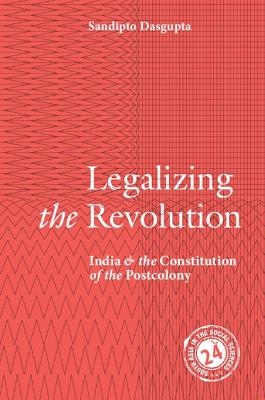
Legalizing the Revolution
India and the Constitution of the Postcolony
Seiten
2024
Cambridge University Press (Verlag)
978-1-009-52524-4 (ISBN)
Cambridge University Press (Verlag)
978-1-009-52524-4 (ISBN)
An innovative synthesis of the history of decolonization and constitutional theory. Contributes to the field of political theory of decolonization; presents an original theory of the Indian constitution as well as the concept of 'postcolonial constitutionalism'; and offers an appraisal of the crisis of democratic institutions in the Global South
Anticolonial movements of the twentieth century generated ambitious ideas of freedom. Following decolonization, the challenge was to give an institutional form to those ideas. Through an original account of India's constitution making, Legalizing the Revolution explores the promises, challenges, and contradictions of that task. In contrast to derived templates, Dasgupta theorizes the distinctively postcolonial constitution through an innovative synthesis of the history of decolonization and constitutional theory. The book traces the contentious transition from the tumult of popular anticolonial politics to the ordered calculus of postcolonial governance; and then explains how major institutions – parliament, judiciary, rights, property – were formed by that foundational tension. A major contribution to postcolonial political theory, the book excavates the unrealized futures of decolonization. At the same time, through a critical account of the making of the postcolonial constitutional order, it offers keys to understanding the present crisis of that order, including and especially in India.
Anticolonial movements of the twentieth century generated ambitious ideas of freedom. Following decolonization, the challenge was to give an institutional form to those ideas. Through an original account of India's constitution making, Legalizing the Revolution explores the promises, challenges, and contradictions of that task. In contrast to derived templates, Dasgupta theorizes the distinctively postcolonial constitution through an innovative synthesis of the history of decolonization and constitutional theory. The book traces the contentious transition from the tumult of popular anticolonial politics to the ordered calculus of postcolonial governance; and then explains how major institutions – parliament, judiciary, rights, property – were formed by that foundational tension. A major contribution to postcolonial political theory, the book excavates the unrealized futures of decolonization. At the same time, through a critical account of the making of the postcolonial constitutional order, it offers keys to understanding the present crisis of that order, including and especially in India.
Sandipto Dasgupta is Assistant Professor of Politics at the New School for Social Research, New York.
Introduction: Decolonization and Constitution; Part I. Revolution without a Revolution: 1. The Anticolonial Movement; 2. Transformations; Part II. Authors: 3. They, The People; 4. The Constituent Administrator; Part III. Institutions: 5. Democracy and Parliamentarism; 6. Rights and Repression; 7. Property and Labour; 8. Judiciary and Lawyers; Conclusion: The Postcolonial Afterlives of Law and Revolution; Epilogue: The Biographies of the Indian Constitution; Notes; Index.
| Erscheinungsdatum | 02.11.2024 |
|---|---|
| Reihe/Serie | South Asia in the Social Sciences |
| Zusatzinfo | Worked examples or Exercises |
| Verlagsort | Cambridge |
| Sprache | englisch |
| Maße | 150 x 228 mm |
| Gewicht | 650 g |
| Themenwelt | Recht / Steuern ► EU / Internationales Recht |
| Sozialwissenschaften ► Politik / Verwaltung ► Politische Theorie | |
| Sozialwissenschaften ► Politik / Verwaltung ► Staat / Verwaltung | |
| ISBN-10 | 1-009-52524-7 / 1009525247 |
| ISBN-13 | 978-1-009-52524-4 / 9781009525244 |
| Zustand | Neuware |
| Informationen gemäß Produktsicherheitsverordnung (GPSR) | |
| Haben Sie eine Frage zum Produkt? |
Mehr entdecken
aus dem Bereich
aus dem Bereich
Der »progressive« Angriff auf Israel, Judentum und …
Buch | Softcover (2024)
edition TIAMAT (Verlag)
28,00 €
ein Vortrag
Buch | Softcover (2024)
Suhrkamp (Verlag)
10,00 €
Hannah Arendts Lektionen in Liebe und Ungehorsam
Buch | Hardcover (2024)
C.H.Beck (Verlag)
26,00 €


